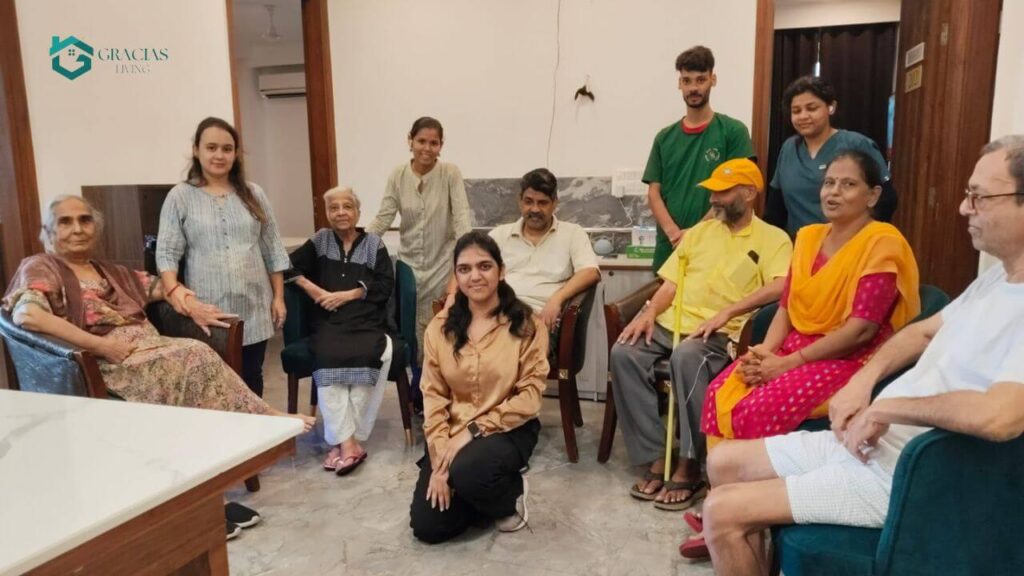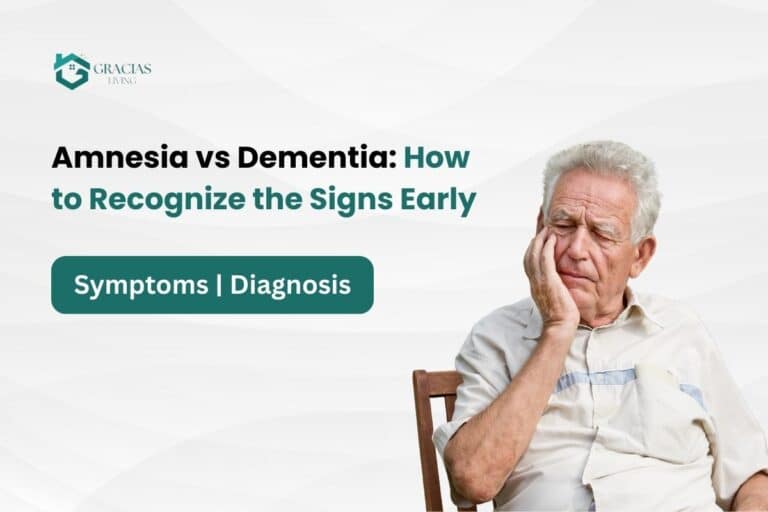Quick Summary of the article:
- Cognitive health is essential for memory, focus, and problem-solving in seniors.
- Simple activities like puzzles, exercise, healthy eating, and socializing boost cognitive function.
- Early diagnosis is key to managing cognitive decline and improving quality of life.
- Cognitive health affects seniors’ independence, emotional well-being, and social interactions.
- Gracias Living offers care and activities to support and maintain seniors’ cognitive health.
Cognitive health refers to the capacity of the brain for clear thinking, learning, memory, and reasoning which is essential at every stage of life.
Prioritizing brain health becomes increasingly crucial as we become older. While some cognitive decline is a natural aspect of aging, there are things we can do to keep our minds sharp.
Cognitive health in senior adults is very important. It helps them remember things, stay focused, and solve problems.
Simple activities like doing puzzles, exercising, eating healthy foods, and spending time with friends can keep the brain sharp.
Good sleep and managing stress are also key. At Gracias Living Senior and Assisted Living, we provide care and fun activities to help seniors keep their minds healthy and happy.

Cognitive changes in senior adults with age.
As we age, our brains, like the rest of our bodies, change. While some memory loss is a typical aspect of aging, it’s critical to distinguish between dementia and other more serious disorders.
A variety of factors influence one’s cognitive health. A loss of mental abilities and the capacity to carry out daily activities including driving, maintaining finances, taking medication, and cooking may be caused by genetic, environmental, or lifestyle causes.
While genetic factors are uncontrollable, environmental and lifestyle factors can be altered and regulated.
Typical Cognitive changes with age:
- Slower processing speed: Solving issues or responding to cues could take longer.
- Memory lapses: It’s common to forget names, dates, or recent events.
- Need help multitasking: It can get harder to focus on several things at once.
- Sleep patterns: Cognitive performance may be impacted by sleep disorders.
It’s important to keep in mind that these adjustments are typically small and have little bearing on daily activities.

A More Severe Deterioration in Cognitive Function
When the changes become more noticeable and interfere with daily activities, there may be a serious problem. Signs and symptoms to identify these are:
- Progressive memory loss: Having trouble recalling recent experiences or well-known facts.
- Language difficulties: Difficulty understanding talks or coming up with the appropriate words.
- Impaired judgment: Making bad choices or acting strangely.
- Disorientation: Getting lost in a familiar place and surroundings and having difficulty in carrying out simple tasks of the day.
A medical evaluation is necessary to rule out underlying disorders such as dementia or Alzheimer’s disease.
Importance of early diagnosis of cognitive impairment
Early diagnosis of cognitive impairment is crucial to maximize quality of life and enable prompt management.
Typical symptoms of cognitive impairment are:
- Memory loss
- Having trouble with daily activities
- Changes in mood or behavior
- Disorientation
- Linguistic difficulties
It is crucial to get evaluated by a healthcare professional if you or your loved one show these symptoms.

Importance of early diagnosis
It helps manage the symptoms more effectively and get the required help on time.
Some approaches are as follows:
- Medication: A few medications can help control the decline symptoms and delay the course of illness.
- Mental Stimulating Therapies: These therapies help to enhance memory, concentration, and problem-solving abilities.
- Lifestyle Adjustments: Lifestyle plays a major role in cognitive decline and it becomes necessary to change some old habits to new ones like regular exercise, a well-balanced diet, and adequate sleep.
Tips for managing the cognitive health of your loved ones
Providing care for a loved one going through cognitive decline can be challenging and emotionally taxing.
It is important to maintain the well-being of the caregiver and the loved one with cognitive impairment. Following are the tips that will help you take care of your loved ones with cognitive impairment:
- Exercise: Regular exercise enhances not only physical but also mental health. Aerobic workouts such as swimming, dancing, and walking improve blood flow to the brain, bringing oxygen and essential nutrients to the area.
- Nutritious meals: A balanced diet rich in fruits, vegetables, whole grains, and lean protein supports every facet of health, including brain function. Among the nutrients that are particularly beneficial for cognitive function are omega-3 fatty acids, which are found in large amounts in fish and flaxseed.
- Mental stimulation: Brain-challenging activities like solving puzzles, reading, writing, and playing board games help in the formation of new synaptic connections.
- Community bonding: Volunteering, socializing, and spending time with loved ones help to stimulate the brain and prevent loneliness among senior adults.
- Sleep schedule: Getting enough sleep is essential for maintaining cognitive function. Try to get between seven and nine hours of good sleep every night to give your brain time to recover.
- Stress Management: Stress that lasts a long time might be harmful to mental health. Incorporate stress-reduction techniques such as yoga, deep breathing, or meditation into your everyday regimen to manage your stress levels.
- Regular check-ups: Regular medical examinations are crucial to identify and treat any health disorders such as diabetes, high blood pressure, and thyroid diseases that may affect cognitive function.

Impact of cognitive health on senior adults
Cognitive health, or the capacity for thought, learning, and memory, is essential for a happy later life.
It has a major impact on older individuals’ quality of life in a number of ways which are as follows:
1. Independence and Self-Sufficiency
- Regular tasks: The capacity to carry out daily chores like driving, handling finances, and cooking can be hampered by cognitive impairment.
- Making decisions: Poor decisions resulting from impaired judgment can have an impact on financial, legal, and healthcare issues.
- Living arrangements: People may need more help or perhaps assisted living as their cognitive function declines.
2. Emotional Well-being
- Confidence and self-esteem: Cognitive decline can erode self-confidence and lead to feelings of isolation.
- Depression: The challenges associated with cognitive impairment can increase the risk of depression.
- Anxiety: Concerns about memory loss and the future can contribute to anxiety and stress.
3. Social Interactions
- Communication issues: Misunderstandings and impeded social relations can result from language issues.
- Decreased social engagement: People may become less socially active as their cognitive deterioration worsens.
4. Physical Health
- Fall risk increased: Falls and injuries can be caused by cognitive impairment.
- Chronic health management: Inadequate knowledge of medical issues and drug administration can have an adverse effect on general physical health.
- Nutrition: Food preferences and eating habits may change as a result of cognitive function changes.
5. Quality of Life
- Lowered quality of life: Cognitive decline may make it more difficult to pursue interests, hobbies, and other activities.
- Loss of independence: People may become more and more reliant on others as their cognitive function declines.
- Financial burden: Caring for a person with cognitive impairment can be expensive.
Quantifying brain fitness with the help of technology
A secret in saving and prolonging the senior brain health lies in technology. Even cognitively stimulating therapies can be administered digitally and provide fun brain-challenging tasks as puzzles, games, and similar activities to allow laying down new synapses.
In addition to this, technology helps in the early detection and management of cognitive impairment by means of health monitoring and effective communication. Already, assisted living homes are starting to access such resources to craft immersive environments that promote memory, concentration and quality of life.
Conclusion
As we age, our brains change, with typical changes including slower processing speed, memory lapses, needing help multitasking, and sleep patterns.
Early diagnosis is crucial to maximize quality of life and enable prompt management. Symptoms include memory loss, difficulty with daily activities, mood or behavior changes, disorientation, and linguistic difficulties.
Managing the cognitive health of loved ones can be challenging. It impacts independence, decision-making, living arrangements, emotional well-being, social interactions, physical health, nutrition, quality of life, and financial burden.
Assisted & Senior living communities like Gracias Living play a crucial role in maintaining and enhancing the cognitive health of senior residents by providing a stimulating, supportive, and safe environment.
It is essential to choose a community that offers a variety of activities and programs tailored to the needs of senior residents.
Frequently Asked Questions
1. How does physical activity affect cognitive health?
Similar to cardio, getting blood to the brain brings blood containing oxygen and nutrients. This boosted circulation is healthy for the mind’s well-being, even forming new pathways between neurons.
2. What are typical cognitive issues in seniors?
Typical, everyday cognitive issues — decelerated processing, some memory loss (names and information) and harder hyper-tasking) Sleep shifts can also impair cognition.
3. Are mental exercises helpful for seniors?
Yes, brain games work. Puzzles, reading, writing, and board games — all these help the brain form new synaptic links and thus keep it engaged and improve memory, as well as concentration and problem-solving abilities.
4. Can medical conditions affect cognitive health?
Yes, they can. Cognition is susceptible to diabetes, hypertension and thyroid disorders. These are easily contracted and treated early by going for regular medical check-ups.
5. Is cognitive decline normal with ageing?
Ageing does produce some minor cognitive decline, such as reduced processing speed or occasional memory loss. More severe decline, such as dementia, is suggested by such extreme decline as to sharply compromise everyday functioning (for example, extreme forgetfulness or disorientation).




